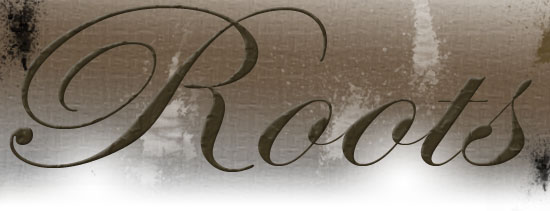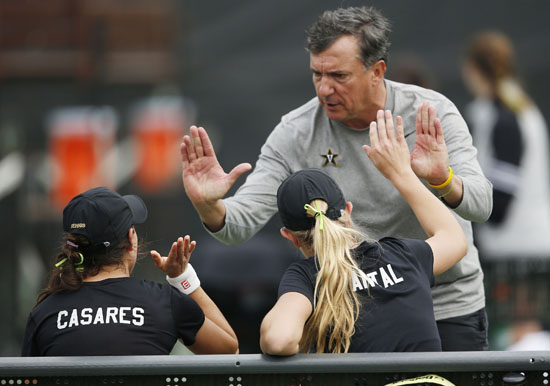May 15, 2013

Roots is a series that profiles Vanderbilt coaches, and reflects back on their lives, forming a roadmap that guides readers through the early years of their lives to where they are today.
What do a taxi cab, a Dillard’s and The Racquet Club of Memphis have in common? They all played an important role in Vanderbilt Head Coach Geoff Macdonald’s foray into a college coaching career. It is a career that eventually led him to Vanderbilt where he is the school’s longest-tenured head coach, having spent the last 19 seasons on West End guiding the school’s women’s tennis program.
While at Vanderbilt, Macdonald has taken the Commodores to unprecedented heights and placed the program among the nation’s elite. Before Macdonald arrived on campus, Vanderbilt had never finished the season ranked or been selected to the NCAA Tournament. Since his arrival, Vanderbilt has made the NCAA Tournament each season and has never finished the year ranked worse than No. 28.
During his coaching career, he has won conference coach of the year honors at three different schools and has claimed four conference championships. Macdonald’s coaching accolades speak for themselves, but the route he has taken to get to where he is today could be vastly different if not for a patient taxi cab driver, a nearby Dillard’s and an athletics administrator who was willing to take a chance on someone with no college coaching experience by meeting him for an interview at The Racquet Club of Memphis.
It was 1988 and Macdonald and his wife, Kate Daniels, had been living in Massachusetts. Kate, a professor, had recently accepted a position at LSU and the family was preparing to move to Baton Rouge, La. Macdonald had been coaching at Northhampton (Mass.) High School, but would soon be in need of a new job.
Macdonald was hopeful he could land a graduate assistantship so he could work on his PHD and help the tennis program at LSU. However, he soon learned LSU did not offer a GA position with tennis. Before the door was completely closed, it swung back open again when the head women’s tennis coaching job opened up not long before the fall semester would be starting.
Hearing of this, Macdonald dialed former LSU assistant athletic director Steve Carter, who is now a state representative in Louisiana. Macdonald gave Carter his sales pitch and it was enough for Carter to ask Macdonald to meet him in person at the Girls 18-Under National Championships in Memphis.
It was August at the time and Macdonald, his wife and their 2-year-old son were driving a U-Haul that was towing a car from Massachusetts to Memphis with a final destination of Baton Rouge, La. It would be in Memphis where Macdonald would earn his first college coaching job, but not before a period of high anxiety occured.
“I had no tennis clothes because they were all packed up so I took a cab to Dillard’s,” Macdonald recalled. “I bought all white tennis clothes, told the cab to wait, and went to The Racquet Club of Memphis. Amazingly, I knew a lot of people in the world so Steve (Carter) was impressed that I knew people, and I knew the game well enough.”
After the face-to-face meeting, Carter hired Macdonald on an interim basis.
Macdonald soon began to experience success and it wasn’t long before the interim tag was removed.

“I fell in love with it,” Macdonald said.
He had coached private lessons and at the high school level, but he didn’t get the same feeling he had when he coached at the college level.
“I think partly because I was pretty self-made in college, I understood that you could go from not very good to good in college if you wanted to,” Macdonald remarked. “For me it was important in terms of personal development to try and be good at something. The college journey for me was so meaningful that I found out that I just loved coaching for that reason.”
A native of Naples, Fla., Macdonald played collegiately at Virginia and eventually played three seasons on the professional tour before taking up coaching. At Virginia, Macdonald won the ACC singles title in 1981, but his time in college was not always smooth sailing.
As a freshman, Macdonald had his scholarship taken away for what he calls “immaturity.”
“I just didn’t understand the commitment,” Macdonald recalled. “I begged the coach to let me back on and he did. I became a really good college player for him and we became close.”
He didn’t know it at the time, but the experience of nearly being kicked off the team would help him later in life as a coach.
“I have a little more patience for young players because I look back at my own experience and I wasn’t ready,” Macdonald said.
Macdonald has leaned heavily on life experiences throughout his time as a coach, but there wasn’t anything that prepared him for when he was ready to move on to a new coaching opportunity. After three seasons at LSU, Macdonald made the hardest decision of his coaching career when he elected to accept the coaching job at Duke.
“LSU was a hard place to leave because I sold the kids on me,” Macdonald said. “I got kids from all over the South to come and I am still friends with them today.”
The job was a step up for Macdonald, but it didn’t make the move any easier for his players at LSU or, most importantly, his family.
Both very successful in their professions, Geoff and his wife, Kate, had agreed, while at LSU, that they would make their next career move based on whoever got the first good job.
It just so happened that it was Geoff who received a coaching offer from Duke.
“What we did was not terribly smart, but we had confidence that we could land on our feet,” Macdonald said.
They did land on their feet, but not the way either had hoped. Geoff had settled into coaching the Blue Devils, but Kate was still looking for work. She had come close to getting hired in Duke’s English department, but a hiring freeze prevented her from getting the job.
Eventually, she was hired as poet in residence at Wake Forest, but the campus was approximately 90 miles away from their home.
“We had little kids and it was killing us both,” Macdonald said. “Just to get the kids up in the morning and on their way … and then if one thing fell through, it was pretty rough.”
Macdonald spent three years at Duke, winning three ACC titles and 84.2 percent of his matches, which remains a Duke record.
Despite his success at Duke, Macdonald saw something at Vanderbilt that made him interested in returning to the SEC.
“When I came here, I lost an incredible team,” Macdonald said. “I didn’t want to leave the team, but I saw such opportunity at Vanderbilt. Vanderbilt to me was waiting to happen. It was Duke in a better conference and a better city.”
So in the fall of 1994, Macdonald began his career at Vanderbilt and hasn’t left.
Macdonald’s wife also found a position at Vanderbilt where she is a highly-successful professor. In April she was one of 175 scholars, artists and scientists throughout the country to be named the 2013 John Simon Guggenheim Memorial Foundation Fellows.
During his 19 seasons, Macdonald has received overtures from other schools as well as opportunities to return to the professional game, but he has remained committed to Vanderbilt.
“Private coaching is really good, but college coaching has been just fantastic,” Macdonald said. “To me it is the best level because although you travel and compete, it doesn’t kill you the way the tour does, and you are developing yourself.
“If it is done right, and players are open to learning, coaching is almost like great military training. You are getting the best classrooms in the country here and you are going out on the court against world class players and you are trying to grow up and manage everything.”
Now 54 years old, Macdonald is well established within his profession and has discovered a formula for success, but he is still looking for ways to improve. Through the years, he has turned to coaches in other sports to provide insight. When he was at LSU, he gleaned tips from track coach Dan Pfaff. At Duke, Macdonald would sit in and watch Mike Krzyzewski’s basketball practices.
“I borrow from everybody,” Macdonald said. “I think you borrow and steal in coaching. I pick brains all the time. I’m kind of radically not a systems thinker. I don’t believe in one method, I think you have to be really flexible.”
Macdonald has also found that staying physically fit helps him as a coach. One way he stays active when he is not on the court is biking. He rides a stationary bike in his office most days of the week.
“I’m really trying to get back to condition because I’ve noticed that I can’t coach as well when I can’t do as much on the court with the players. So I am trying to get back down to fighting weight,” said Macdonald as he tried to catch his breath during a workout on his stationary bike.
While riding his bike, Macdonald often reads books. An avid reader, he reads multiple books at a time, rotating between ones that peak his interest on a given day. He also writes blogs for the New York Times during the four tennis Grand Slam tournaments that take place each year. “I enjoy writing and I really find it to be a fun experience,” Macdonald said of his work with the Times.
When Macdonald first got into coaching, he and his family zigged and zagged through the country as they looked for a more longterm location to call home. In 1994 they moved to Nashville, Tenn., unsure of where the road would take them next, not expecting that they had reached their destination. It’s since been 19 years and Macdonald still has no intentions of going elsewhere.
“It is an extraordinary school and it keeps getting better,” Macdonald said. “I’ve been treated well and I’m extremely happy. It’s a great place to raise a family and Nashville keeps getting more and more interesting.”

What books are you currently reading?
Mind Games, How To Write A Sentence And How To Read One and Heart Math.
Besides tennis, what was your favorite sport to play?
Basketball. I could have played in high school, but tennis season began in January so I couldn’t do both.
What similarities do you see between the basketball and tennis?
Every possession is a point. Turnovers are unforced errors. Court positioning is important. Helping prevent the offense from setting up deep. Fighting for position. Shot selection.
How important was former men’s tennis coach Bill Tym in you coming to Vanderbilt?
He was probably one of the main reasons why I came here and took this job. He was a mentor early on. He’s a legend, quite frankly. He has developed so many good players and he’s a genius. He is a master teacher and getting to work with him and just pick his brain was great.



